58 animals
sterilized on this date!
Our
fifth sterilization blitz was held on March 4, 2007, again at the
offices of Francia Pinedo (Bienes Raices Volcán). Our three vets were Dr. Andres Tello from Costa Rica, and
Dra. Letty de Guajardo and Dr. Rene Guajardo from Panama City.
We
sterilized 44 dogs and 14 cats. Most of them belonged to lower-income
Panamanians; therefore contributions were minimal. Surgeries for big
dogs take the longest; and as usual, we had a lot of VERY BIG dogs, some
of them pregnant or in heat and/or having venereal tumors, in which cases the surgeries take even
longer. Remember, venereal tumors among dogs are rampant in Panama. The tumors
for both male and female are eventually fatal; however, the tumors are
internal at first and are not noticeable until they become so large that
they become evident externally as well.
During
recovery, we had to give one small dog a subcutaneous saline solution because she was
very slow to wake up. (No problem; she recovered just fine.)
MANY
thanks
to our wonderful volunteers:
 Bill
Fulleton (registrar), with the help of Ruby McKenzie from Boquete; Bill
Fulleton (registrar), with the help of Ruby McKenzie from Boquete;
 Dr. Chely (from
Boquete) and Manuel Caballero who did the weighing of animals and gave
the anesthesia; Dr. Chely (from
Boquete) and Manuel Caballero who did the weighing of animals and gave
the anesthesia;
 Wally Ewan and
Gene Robinson who did the shaving and pre-op cleaning of the animals;
and Eymi Pitti Arcia, a young volunteer who helped clean the tables
and animals and whatever else she could do in pre-op; Wally Ewan and
Gene Robinson who did the shaving and pre-op cleaning of the animals;
and Eymi Pitti Arcia, a young volunteer who helped clean the tables
and animals and whatever else she could do in pre-op;
 Yina Ortiz, who
gave the pre-op injections of antibiotics and pain prevention; Yina Ortiz, who
gave the pre-op injections of antibiotics and pain prevention;
 Gene Robinson
also used his pickup and served as a "taxi" to deliver
owners and their animals when it was too far for the animals to walk
right after surgery; Gene Robinson
also used his pickup and served as a "taxi" to deliver
owners and their animals when it was too far for the animals to walk
right after surgery;
 Yimel Caballero
and Maria Nillireth, who kept the operating tables clean, cleaned the
surgical instruments, and operated the autoclave; Yimel Caballero
and Maria Nillireth, who kept the operating tables clean, cleaned the
surgical instruments, and operated the autoclave;
 Judy Odom (from
Boquete) and Fariza Castillo, who did the post-op cleaning and care of
the animals and gave the post-op injections of anti-parasite and
vitamin B-12; Judy Odom (from
Boquete) and Fariza Castillo, who did the post-op cleaning and care of
the animals and gave the post-op injections of anti-parasite and
vitamin B-12;
 Francia Pinedo,
who graciously allowed us to use her offices for the clinic, plus
assisted in the recovery area; her young nephew Kevin was also a big
help; Francia Pinedo,
who graciously allowed us to use her offices for the clinic, plus
assisted in the recovery area; her young nephew Kevin was also a big
help;
 Janet Robinson,
who took 128 pictures of the event; (I had a difficult time choosing
just a few for the web site, which appear below); Janet Robinson,
who took 128 pictures of the event; (I had a difficult time choosing
just a few for the web site, which appear below);
 Jennifer Taylor,
a new but very important part of our team. Jennifer went to the
airport in David on Saturday and brought Dr. Letty and Dr. Rene to
Volcan. She also took them back to the airport on Monday morning.
Jennifer also made and donated 30 sandwiches for the clinic. She
helped in the operating area and did anything else that was asked of
her - and paid $40 for her neighbor's dog to be sterilized; Jennifer Taylor,
a new but very important part of our team. Jennifer went to the
airport in David on Saturday and brought Dr. Letty and Dr. Rene to
Volcan. She also took them back to the airport on Monday morning.
Jennifer also made and donated 30 sandwiches for the clinic. She
helped in the operating area and did anything else that was asked of
her - and paid $40 for her neighbor's dog to be sterilized;
 Steve Borgman,
Jose Espinoza, Jennifer Santamaria, Ramses Rongel, all of whom did
anything that was needed at the time. (I hope I read the sign-in sheet
of their names correctly; there were others who helped but did not
sign in - so thanks to everyone. Steve Borgman,
Jose Espinoza, Jennifer Santamaria, Ramses Rongel, all of whom did
anything that was needed at the time. (I hope I read the sign-in sheet
of their names correctly; there were others who helped but did not
sign in - so thanks to everyone.
 Also, thanks to
Super Berard for donating the soft drinks for our doctors and
volunteers, and to Anne and Ken Reid for making and donating 30
sandwiches. Also, thanks to
Super Berard for donating the soft drinks for our doctors and
volunteers, and to Anne and Ken Reid for making and donating 30
sandwiches.
Income
and financial donations:
| $
297.00 |
contributions
by owners/guardians |
|
20.00 |
cash
donation by Ken and Anne Reid |
|
20.00 |
cash
donation by Judy Odom |
|
25.00 |
cash
income from calendar sales |
|
20.00 |
cash
donation by Gene and Janet Robinson |
|
40.00 |
cash
donation by Jennifer Taylor |
|
671.00 |
other
cash donations (see *note below) |
|
100.00 |
cash
donation by "anonymous" |
|
100.00 |
cash
donation by Sharon and Milt Borgman |
| $1,293.00 |
total
income |
*Note: The $691 was donated to Spay/Panama in Panama City to be used
for Chiriqui. Donors were: Susan Garcia, $48.25; Marny Hohl from
Canada, $160.13; Jeanne Brantingham, $23.97; Ruth King, $400; Linda
English, $38.54. (Totals are after deducting Paypal fees and in the
case of the Canadian donor, after currency conversion as well.)
Costs for this
clinic were $2,180 (including $1,030 paid to the veterinarians),
leaving a deficit of $887. Great
news: Tom and Linda English, who have a TV show "Pet
Talk" in New London, CT, interviewed me during our clinic and did
some filming, which will be shown on "Pet Talk." They will
send me copies of the film and we hope to have some Panama TV stations
show it. Also, David Dell interviewed me for an article he will write
for "The Visitor" here in Panama. Ruby
McKenzie from Boquete donated about 75 laminated tags to attach to
each animal. Initially someone writes with a felt-tip marker the
weight of the animal, the name and/or owner, whether it's a dog or
cat, male or female, and the amount of anesthesia given (according to
weight). Then as the animal moves through the "line," the
pre-op person makes a notation after giving the shots for
antibiotics and pain. In the operating room, the vet notes the name,
species, and sex of the animal on his or her individual tally sheet.
(That way, we can always compare the tags with the vets' tally sheet
and see which vet operated on which animal.) After the animal
goes to post-op, the person there makes a checkmark beside the proper
line after giving injections of B-12 and anti-parasite (and Rabies vaccination
if we have it available), flea and tick treatment, clipping nails
and/or cleaning ears. They also note the time they finished the
post-op treatments. That way, we can tell if an animal is slow to wake
up and needs extra attention. Our after-care volunteers monitor the
animals, keep them warm, and massage them to help wake them up. If an
animal shows any indication of a problem, the after-care volunteers
take the animal's temperature every 10 or 15 minutes and monitor their
heartbeat and breathing rate. On the back of the tag, they note the
temperature and the time it was taken. (That way we can tell if the
temperature is approaching normal or not.) If an animal is too cold,
it is placed on a heating pad and monitored so that it doesn't get too
warm. The animal is turned from one side to the other every 10
minutes. In a few cases, an animal is given saline solution or
dextrose subcutaneously - or via IV when occasionally it is
advised. These
tags are invaluable in helping us keep track of the animals, what
injections they have been given, and monitoring their condition at all
times. After the clinic, the tags are cleaned with paint
thinner to be reused for the next clinic. Following
are pictures taken by Janet Robinson during the clinic:
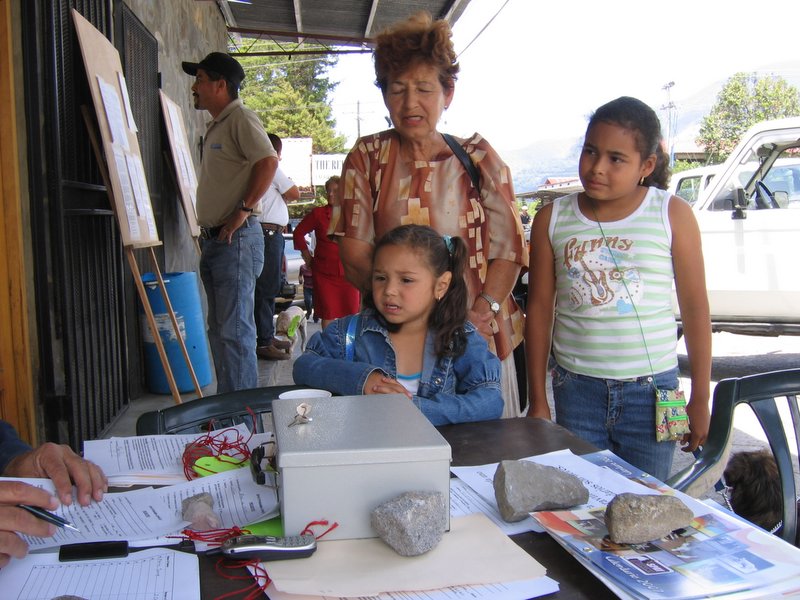
Above, registration table.
Center, Bill Fulleton and Ruby McKenzie, registrars. |
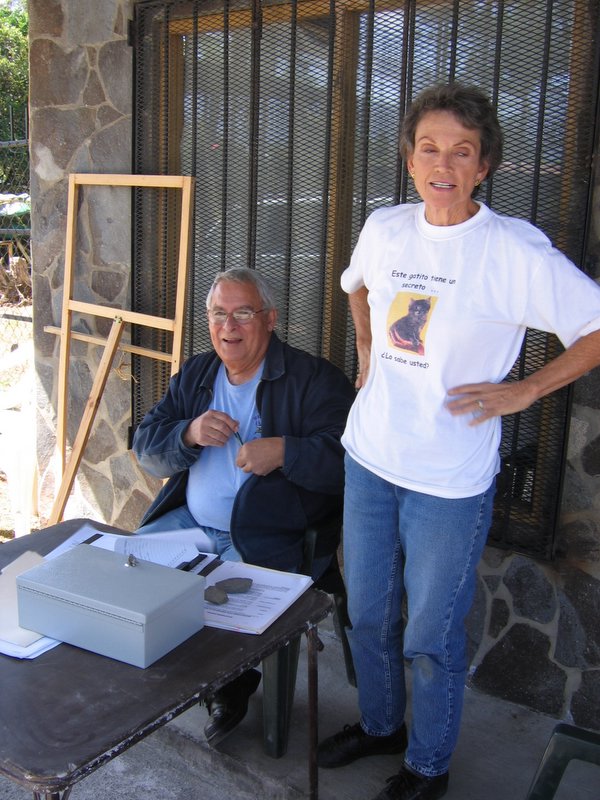 |
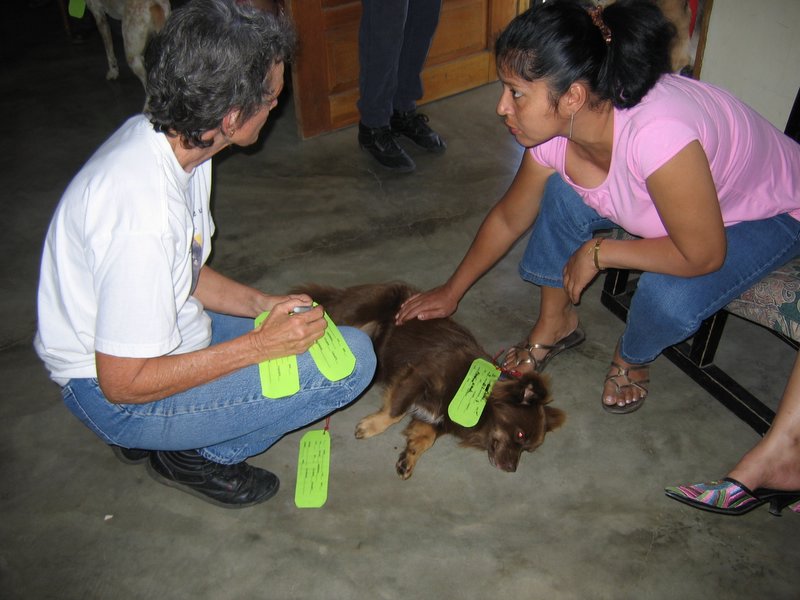
Tags being prepared for
animals. |
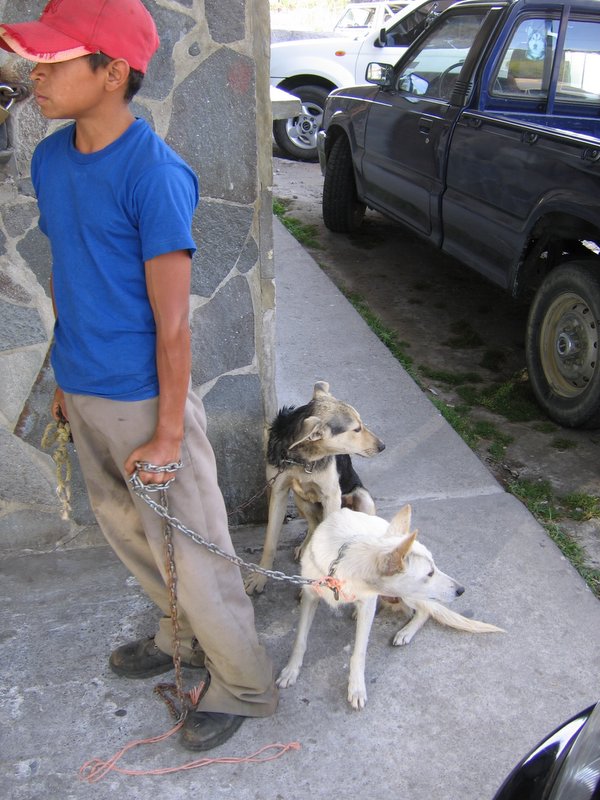
Two dogs wait their turn. |
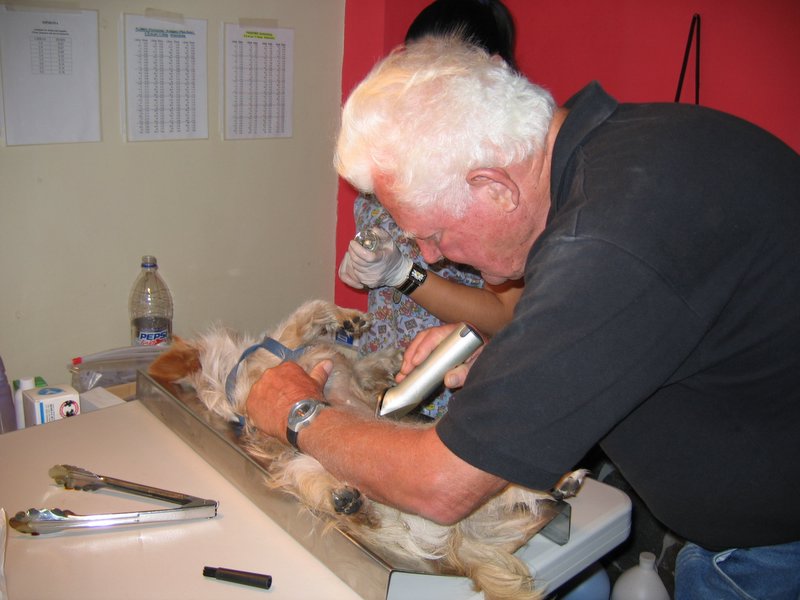 Wally Ewen in pre-op shaves
an animal. |
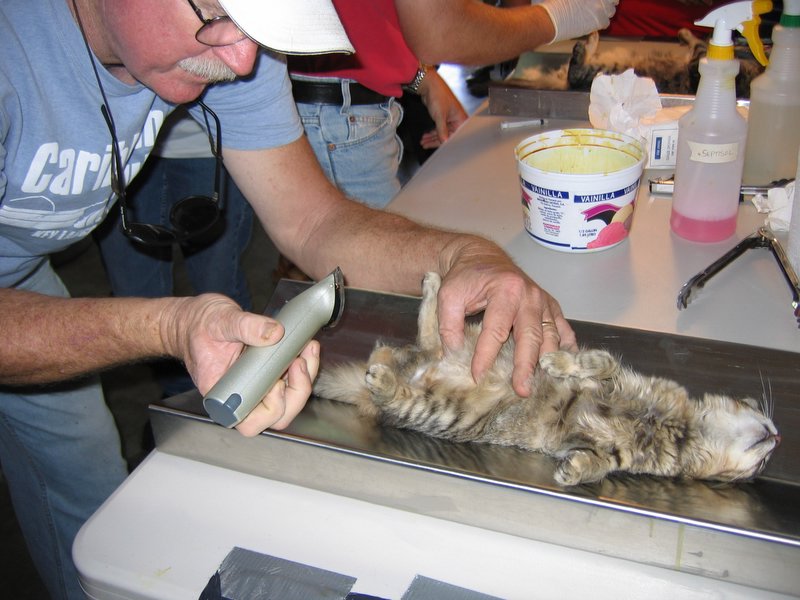

Gene Robinson in pre-op
shaving and prepping a kitty. |
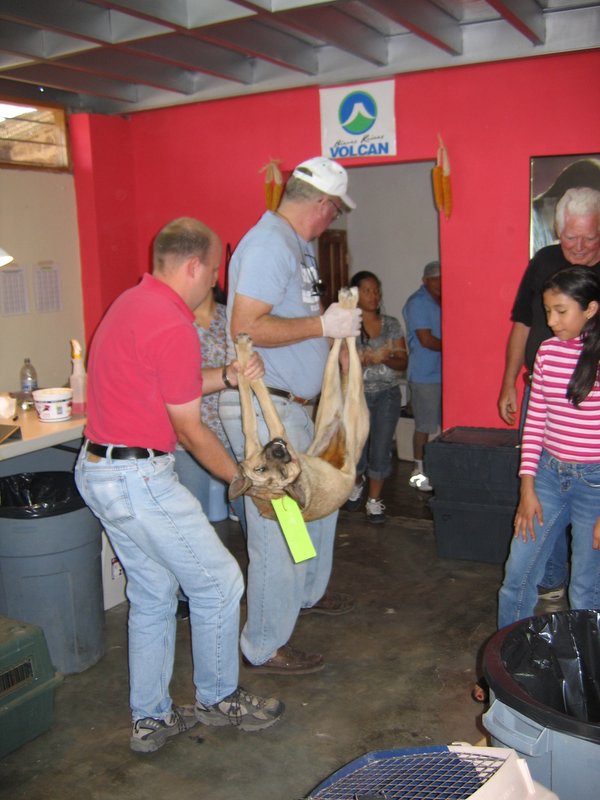
Steve Borgman & Gene
Robinson "taxi" a large dog from pre-op to the
operating table.
|
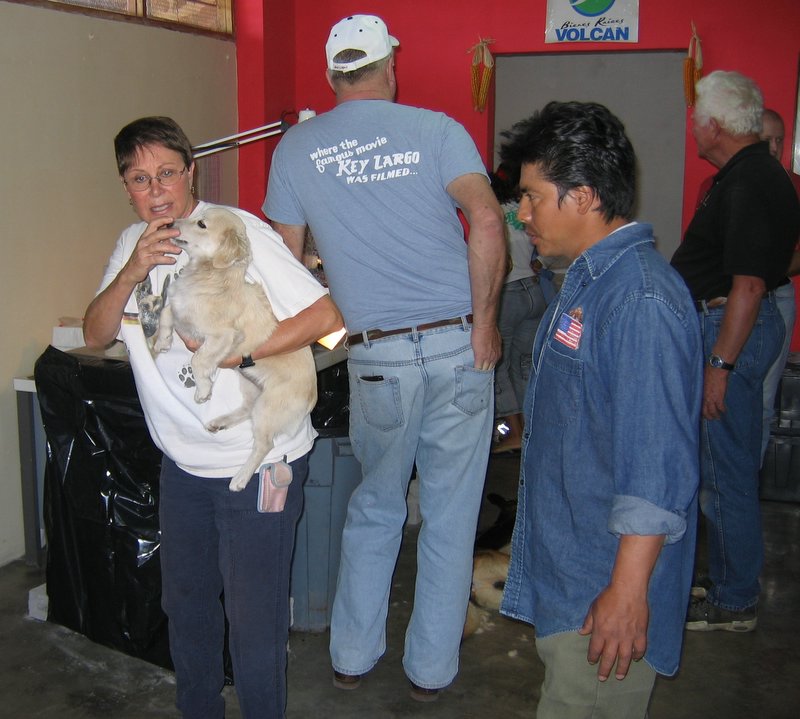
Here I'm taking our latest
adopted street dog (the 9th!) for his anesthesia. Manuel
Caballero is on the right; Gene Robinson's back is to the
camera. |
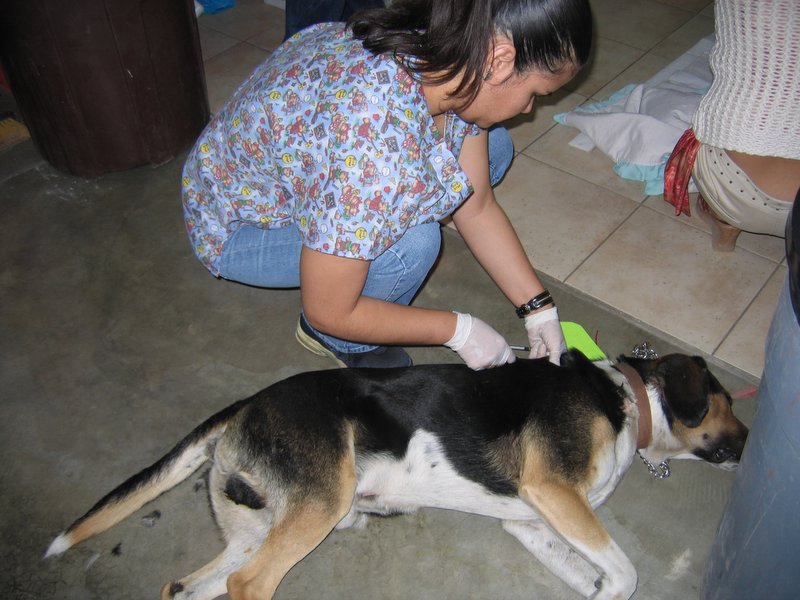
Yina Ortiz gives pre-op
injections. (Big dogs must be shaved and prepped on the floor;
the tables simply aren't big enough for these large dogs.) |
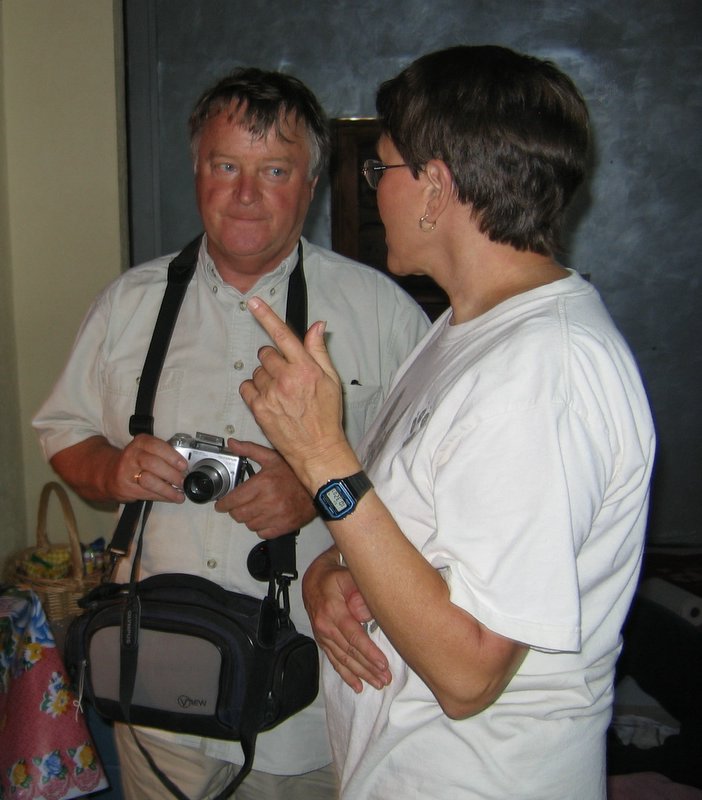
David Dell interviews
Dottie Atwater for article in "The Visitor" |
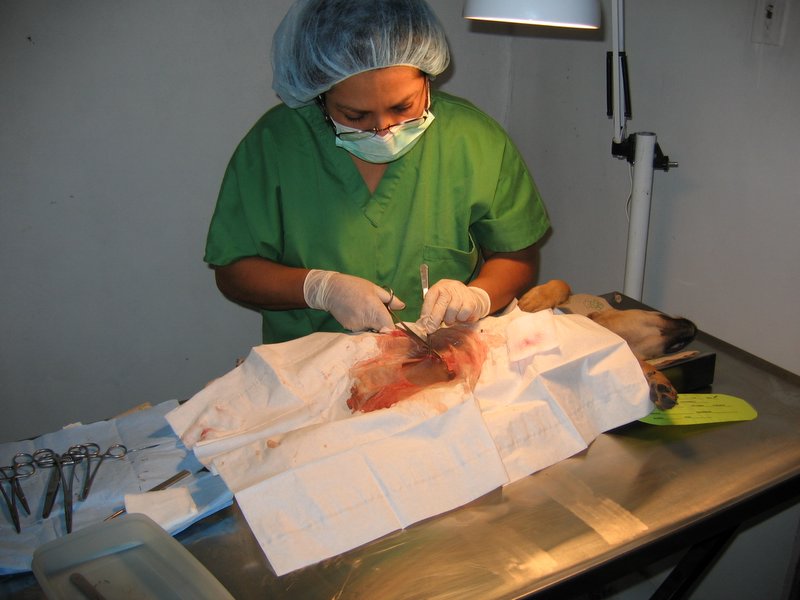
Dr. Letty performing a
sterilization. |
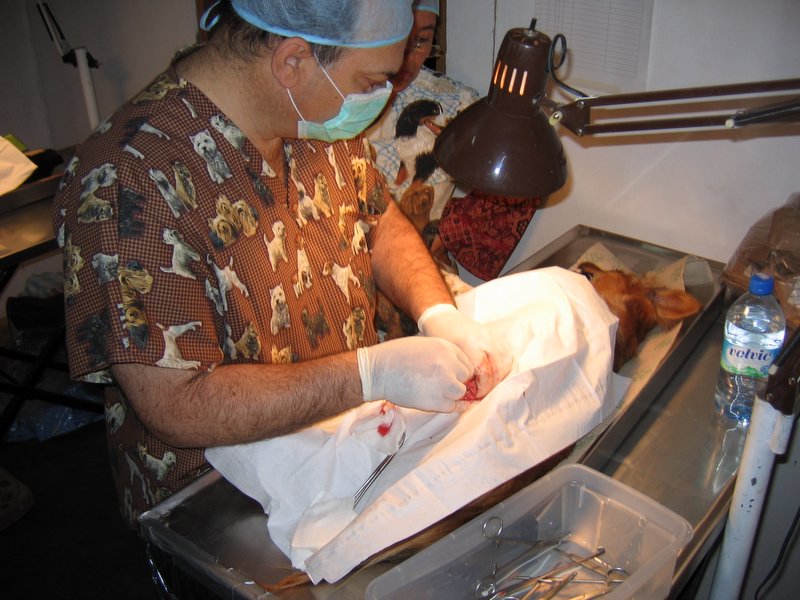
Dr. Letty's husband, Dr.
Rene, performing surgery. |
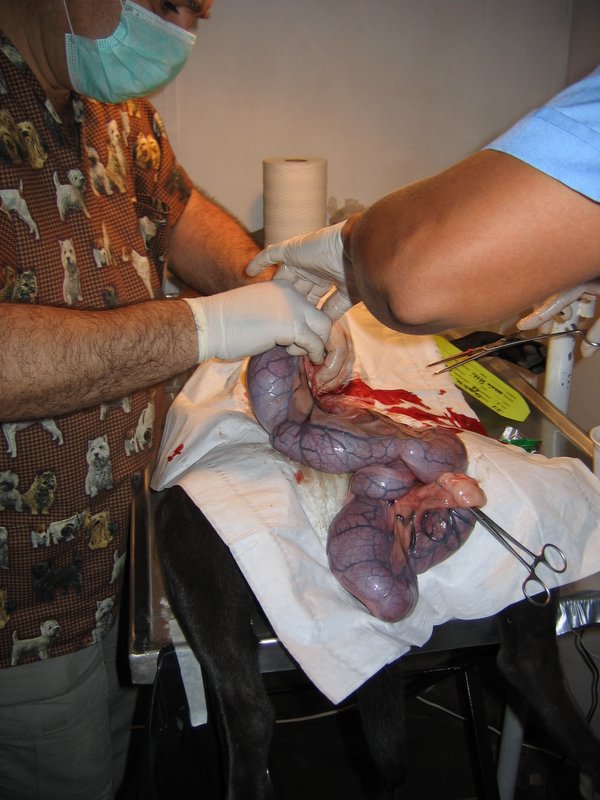
Above: Dr. Rene and Dr.
Tello perform an abortion before spaying a female dog. |
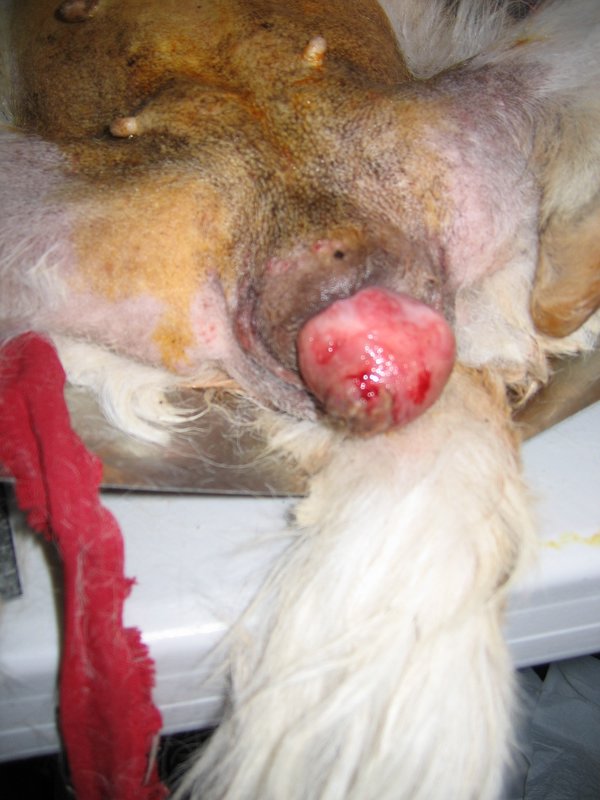 |
Left:
still another venereal tumor, smaller than many of them that we
see...highly contagious and passed from dog to dog to dog...
(Sorry for the graphic details, folks, but this is real life for
these neglected animals in Panama!) |
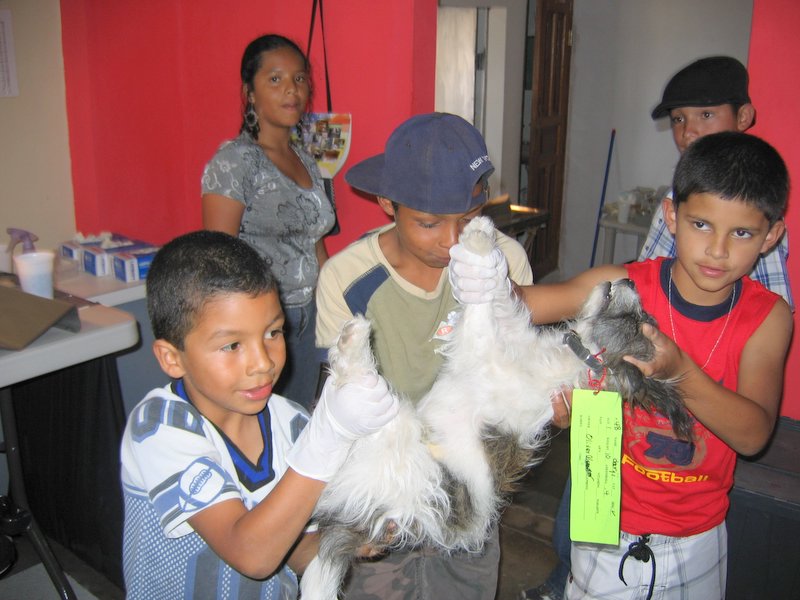
Kevin Pinedo and other
volunteers help "taxi" a dog from surgery to post-op.
Yimel Caballero is in the background. |
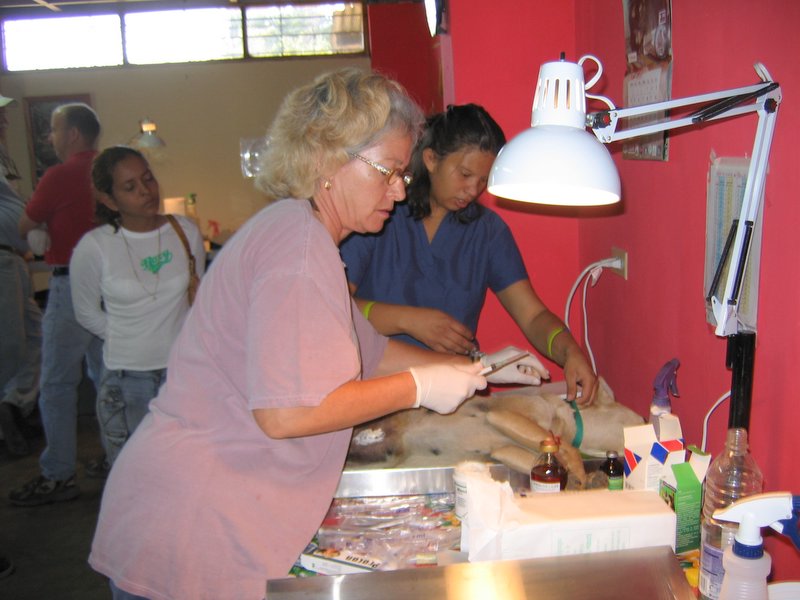
Judy Odom and Fariza
Castillo perform post-op duties. |
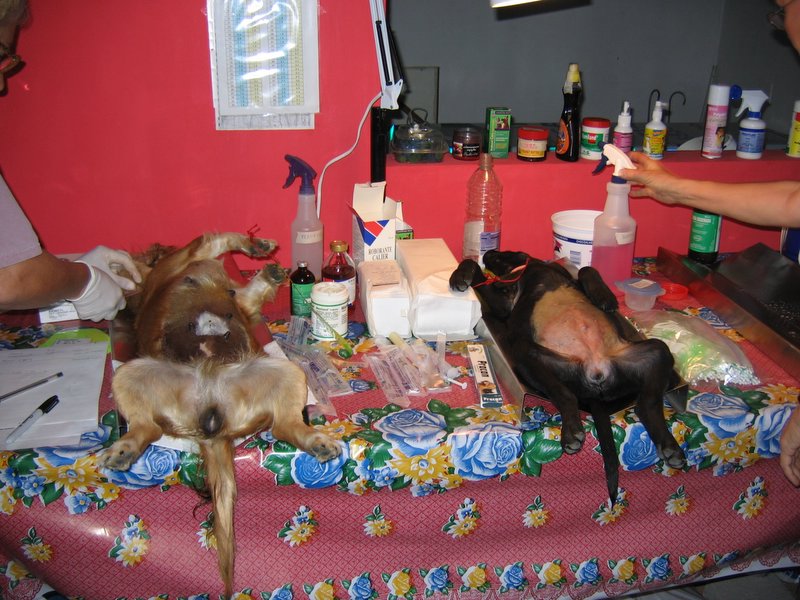 
Two dogs ready to be moved
to the recovery area. |
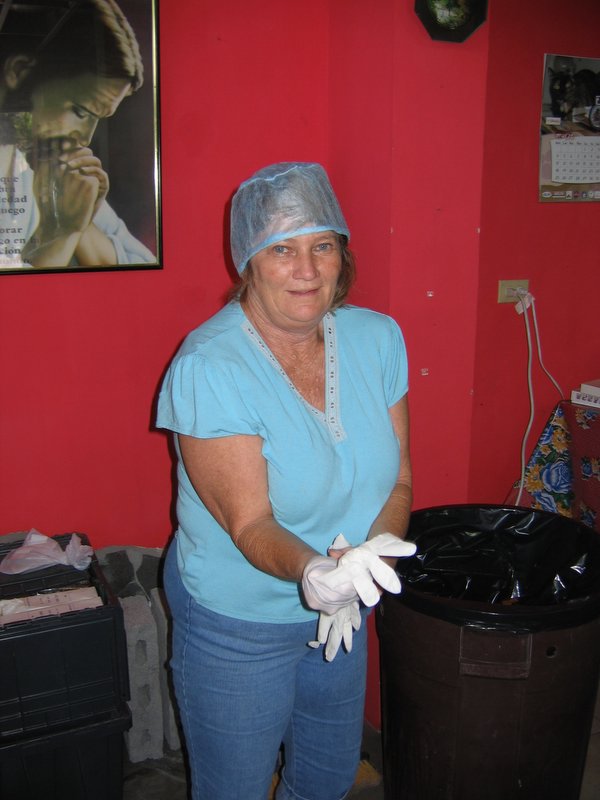 |
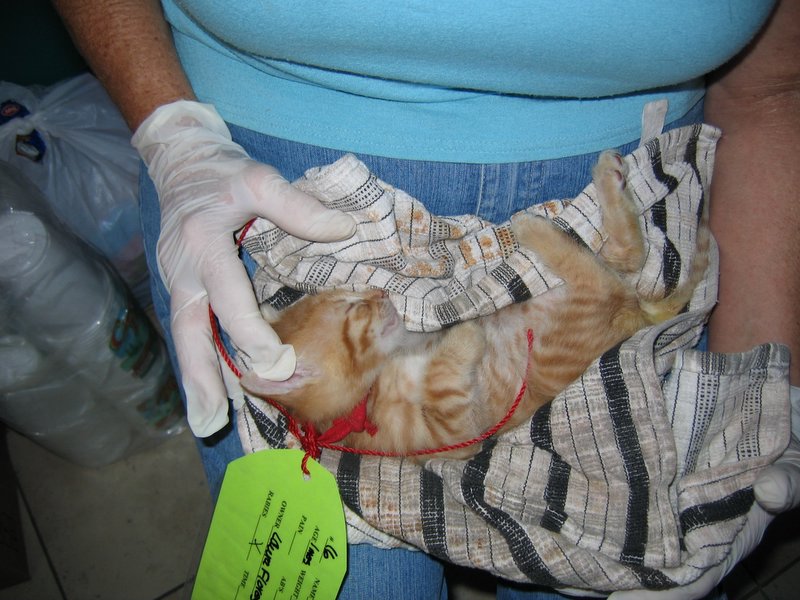
Left: Jennifer Taylor ready
for action; Above: caring for a kitten in recovery. |
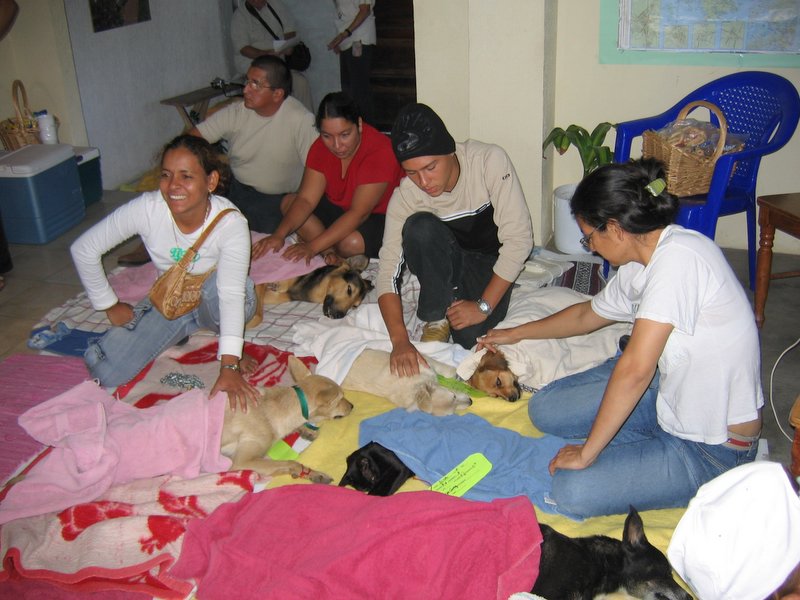
Francia Pinedo (right) and
others caring for animals in recovery. |
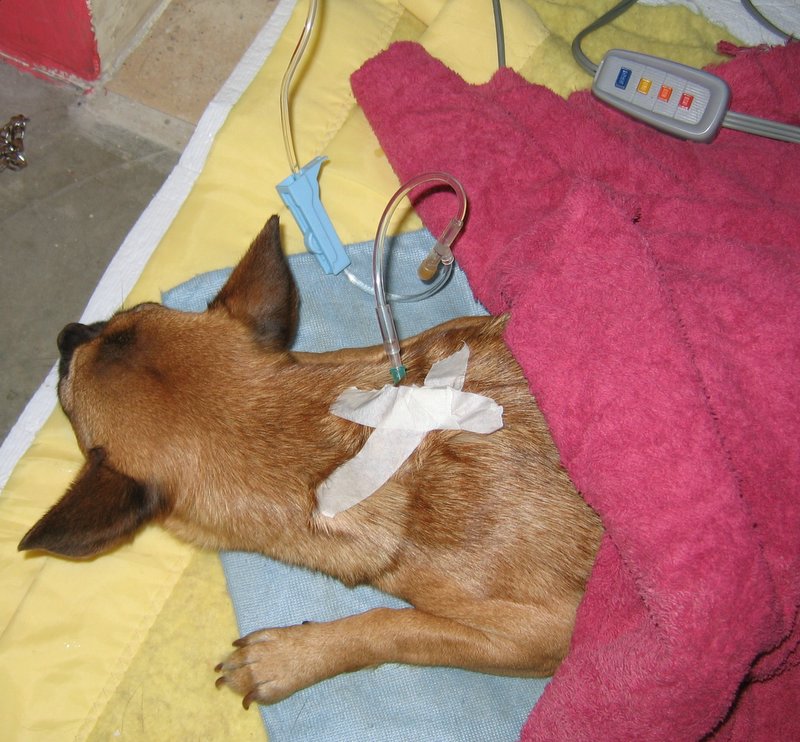 . .
This little lady is
receiving a sub-Q administration of saline fluids. |
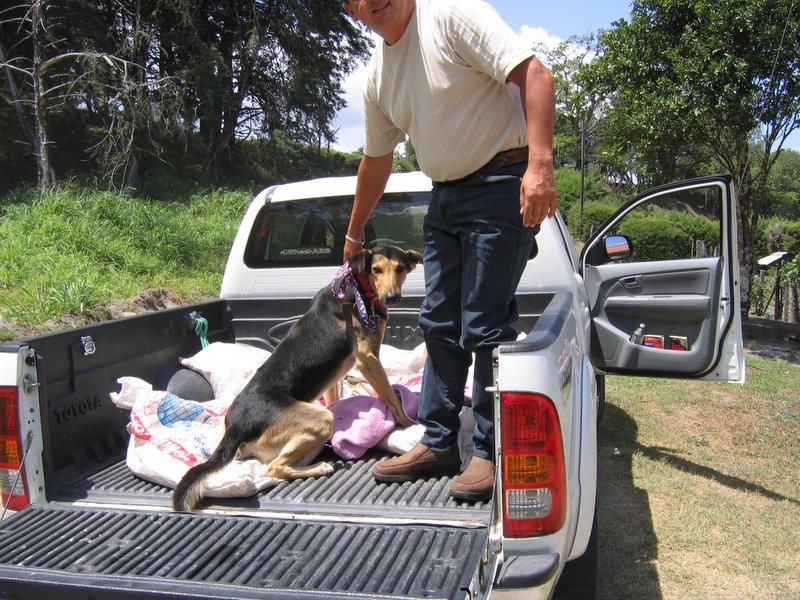
Time for the volunteer
"taxi" to take this doggie home. |
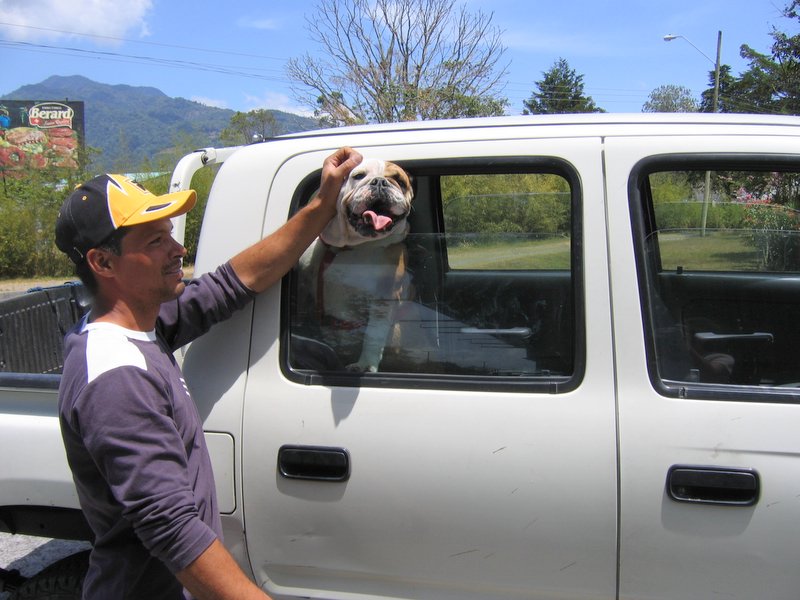
A young man with his happy
dog. |
Thanks
so much for all of our wonderful volunteers and everyone who has
participated in the sterilization process for these dogs and cats. We simply could not
provide this vital service without you! I love you all - and so do these fortunate animals! Together we can
make a difference!
Here
in Volcan, our group has been responsible for sterilizing 200 animals to
date. Added to the 129 animals that Spay/Panama sterilized in in Volcan
in February of 2005, we have sterilized 329 dogs and cats! There are
many more to go, but we are making progress!
Dorothy
Atwater - 771-5883 or 6780-2565 or viajar2566@yahoo.com
Back to Clinics
Page
Back to
HOME PAGE
|